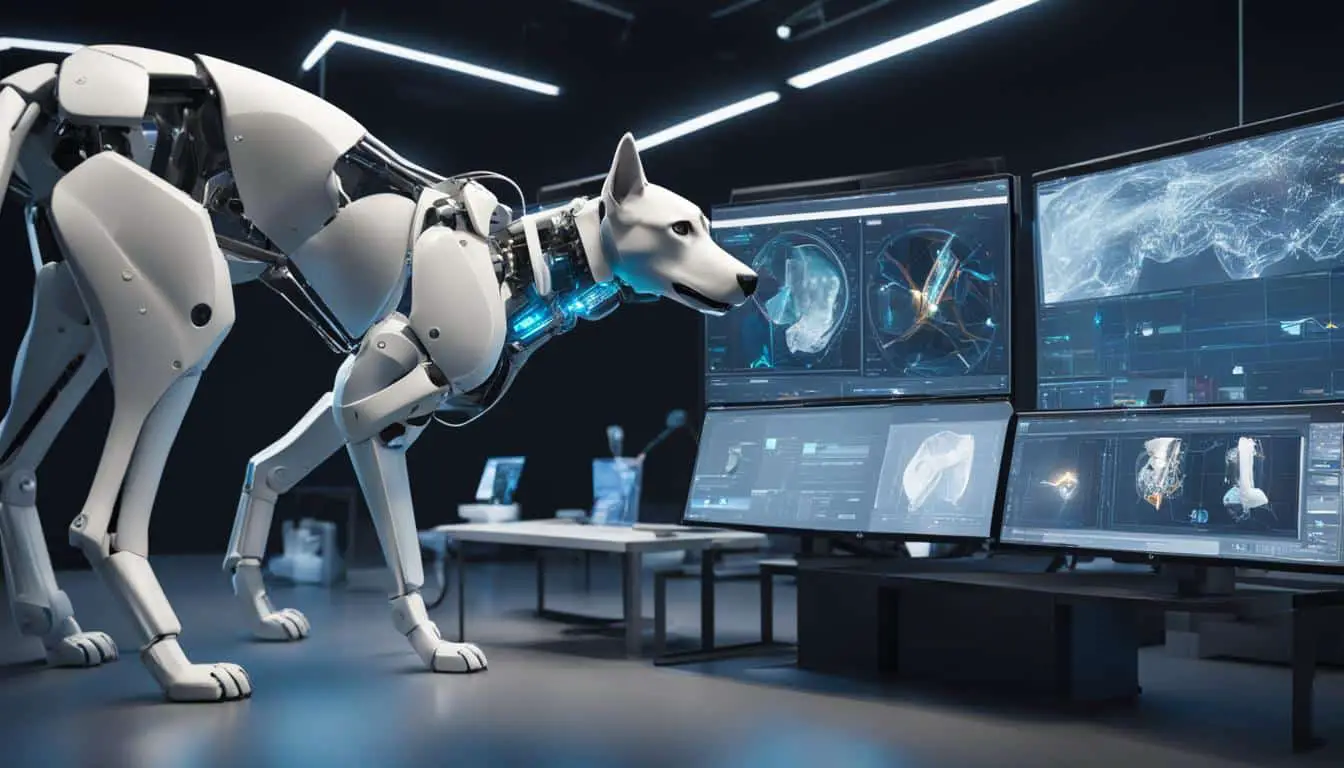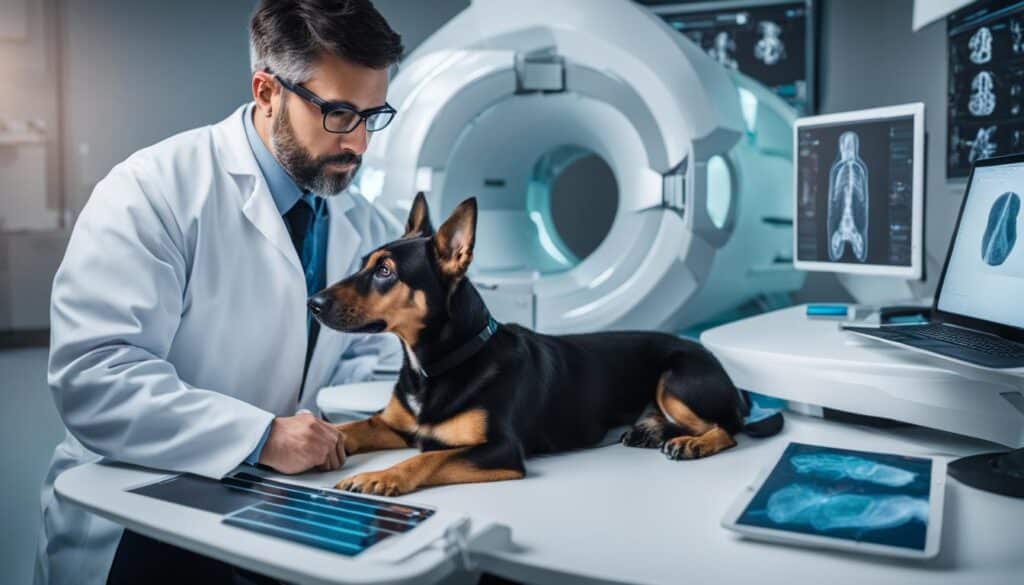
Artificial intelligence (AI) is revolutionizing the field of veterinary medicine, particularly in diagnostics and treatment planning. As technology advances, AI is making its way into the veterinary industry, offering new possibilities for improving the accuracy and efficiency of diagnostic imaging and overall pet care.
AI has the potential to enhance various aspects of veterinary diagnostics. It can assist in accurate radiography positioning, identify abnormalities in radiographs, and improve the quality of diagnostic imaging. This technology is also being developed to reduce the need for retakes, resulting in less time under sedation and decreased exposure to radiation for animals.
Beyond diagnostic imaging, AI has numerous potential applications in veterinary medicine, including medical record assessment and drug development. It can analyze large datasets, identify patterns, and provide valuable insights into animal health. However, the proper development and ethical use of AI systems are crucial to ensure accurate diagnoses and improve the overall well-being of pets.
Key Takeaways:
- AI is transforming veterinary medicine by enhancing diagnostic imaging and treatment planning.
- It can assist in accurate radiography positioning and improve the quality of diagnostic imaging.
- AI has numerous potential applications in veterinary medicine, including drug development and medical record assessment.
- The development and ethical use of AI in veterinary medicine are crucial for accurate diagnoses and improved pet health.
- Further research and development are needed to improve the accuracy and adoption of AI systems in veterinary diagnostics.
The Role of AI in Veterinary Diagnostics
AI is revolutionizing the field of veterinary diagnostics, offering unprecedented capabilities in quick and accurate analysis of symptoms and medical history. With the use of AI-powered imaging tools and algorithms, veterinary professionals can now benefit from enhanced diagnostic capabilities and improved treatment planning.
One of the key contributions of AI in veterinary diagnostics is its ability to analyze medical images such as X-rays and MRIs. AI-powered imaging tools can detect subtle abnormalities in these images that may go unnoticed by the human eye. This not only improves the accuracy of diagnosis but also enables early detection of potential health risks, allowing for timely intervention and prevention of serious conditions.
Furthermore, AI algorithms can develop personalized treatment plans for animals based on their unique characteristics and health history. By analyzing vast amounts of data, AI can identify patterns and correlations that human veterinarians may not be able to. This enables more tailored and effective treatment approaches, leading to better outcomes for animal patients.
In addition to diagnosis and treatment planning, AI also plays a crucial role in monitoring the progress of animals during treatment. Wearable devices equipped with AI technology can collect real-time data on various health parameters, allowing for continuous monitoring of an animal’s condition. This data can then be used to make adjustments to the treatment plan, ensuring optimal care and maximizing the chances of a successful recovery.

Enhancing Veterinary Research
AI is not limited to clinical applications but also has the potential to revolutionize veterinary research. By analyzing large datasets, AI algorithms can identify patterns and trends that may lead to new insights into animal health. This can drive advancements in drug development, disease prevention, and overall veterinary knowledge.
AI in veterinary diagnostics is an invaluable tool that supports veterinarians in their work, enhancing their diagnostic capabilities and improving patient care.
It is important to note that AI is not a replacement for human veterinarians but rather a tool that complements their expertise. The ethical use of AI and the respect for animal welfare are paramount in its implementation. With further research and development, AI is poised to have an even greater impact on veterinary medicine, benefiting animals worldwide.
Conclusion
AI Veterinary Medicine Diagnostics has the potential to revolutionize the field of animal healthcare. With its ability to enhance diagnostic imaging, develop personalized treatment plans, and monitor animal progress, AI is transforming veterinary practice.
By enabling faster and more accurate diagnosis, AI is improving the quality of animal healthcare. Veterinary professionals can utilize AI-powered imaging tools and algorithms to identify abnormalities that may be missed by the human eye. This allows for early intervention and prevention of potential health risks.
However, it is essential to remember that AI is a tool and cannot replace the empathy and intuition brought by veterinarians. Ethical use of AI and respect for animal welfare must be maintained throughout its integration in veterinary diagnostics.
As further research and development continue, AI is likely to have an even greater impact on veterinary medicine. It has the potential to advance research, contribute to the development of new treatments, and improve preventive measures. With responsible implementation, AI Veterinary Medicine Diagnostics will benefit animals worldwide.
FAQ
What is the role of AI in veterinary diagnostics?
AI plays a crucial role in veterinary diagnostics by enhancing diagnostic imaging and treatment planning. It can assist in accurate radiography positioning, identify abnormalities in radiographs, and improve the quality of diagnostic imaging.
How is AI used in veterinary medicine?
AI is utilized in various ways in veterinary medicine. It can assist in capturing X-rays and reduce the need for retakes, resulting in less time under sedation and decreased exposure to radiation. AI can also be used for medical record assessment, drug development, and more.
Are there AI systems specifically developed for veterinary diagnostics?
Yes, AI systems for interpretation of X-rays in dogs and cats are currently available. However, further research is needed to improve their accuracy and adoption in veterinary medicine.
How does AI improve patient outcomes in veterinary medicine?
AI is transforming the diagnostic process by allowing for quick and accurate analysis of symptoms and medical history. AI-powered imaging tools can analyze X-rays and MRIs, identifying abnormalities that may be missed by the human eye. AI algorithms can also predict potential health risks, enabling early intervention and prevention.
Can AI help in developing personalized treatment plans for animals?
Yes, machine learning algorithms can develop personalized treatment plans for animals based on their unique characteristics and health history. AI can also monitor an animal’s progress during treatment through wearable devices, providing real-time data for adjustments to the treatment plan.
How does AI benefit veterinary research?
AI’s ability to analyze large datasets allows for the identification of patterns and trends that can lead to new insights into animal health. This advances research in veterinary medicine and can lead to new treatments and preventive measures.
Is AI a replacement for human veterinarians?
No, AI in veterinary diagnostics is not a replacement for human veterinarians. It is a tool to aid in their work and enhance the quality of animal healthcare.
What is the importance of ethical use of AI in veterinary diagnostics?
Ethical use of AI and respect for animal welfare are crucial in the integration of AI in veterinary diagnostics. Careful consideration and development are essential to ensure accurate diagnoses and improve pet health.
How is AI revolutionizing veterinary medicine?
AI is revolutionizing veterinary medicine by improving the quality of animal healthcare, from diagnosis to treatment. It enables faster and more accurate diagnosis, personalized treatment plans, and monitoring of animal progress during treatment.
What can we expect from the future of AI in veterinary medicine?
With further research and development, AI is likely to have an even greater impact on veterinary medicine, benefiting animals worldwide.
Source Links
- https://ovc.uoguelph.ca/news/node/2628
- https://ts2.space/en/ai-in-veterinary-medicine-from-diagnosis-to-treatment/
- https://ufhealth.org/news/2023/innovative-veterinary-learning-health-care-system-at-uf-will-use-ai-to-improve-clinical-care-and-treatments








